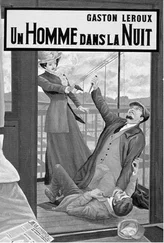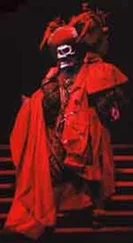“Touching picture of love!”
The captain, more and more embarrassed, fell back upon the subject of the tapestry,—“‘Tis, in sooth, a charming work!” he exclaimed.
Whereupon Colombe de Gaillefontaine, another beautiful blonde, with a white skin, dressed to the neck in blue damask, ventured a timid remark which she addressed to Fleur-de-Lys, in the hope that the handsome captain would reply to it, “My dear Gondelaurier, have you seen the tapestries of the Hôtel de la Roche-Guyon?”
“Is not that the hotel in which is enclosed the garden of the Lingère du Louvre?” asked Diane de Christeuil with a laugh; for she had handsome teeth, and consequently laughed on every occasion.
“And where there is that big, old tower of the ancient wall of Paris,” added Amelotte de Montmichel, a pretty fresh and curly-headed brunette, who had a habit of sighing just as the other laughed, without knowing why.
“My dear Colombe,” interpolated Dame Aloise, “do you not mean the hotel which belonged to Monsieur de Bacqueville, in the reign of King Charles VI.? there are indeed many superb high warp tapestries there.”
“Charles VI.! Charles VI.!” muttered the young captain, twirling his moustache. “Good heavens! what old things the good dame does remember!”
Madame de Gondelaurier continued, “Fine tapestries, in truth. A work so esteemed that it passes as unrivalled.”
At that moment Bérangère de Champchevrier, a slender little maid of seven years, who was peering into the square through the trefoils of the balcony, exclaimed, “Oh! look, fair Godmother Fleur-de-Lys, at that pretty dancer who is dancing on the pavement and playing the tambourine in the midst of the loutish bourgeois!”
The sonorous vibration of a tambourine was, in fact, audible. “Some gypsy from Bohemia,” said Fleur-de-Lys, turning carelessly toward the square.
“Look! look!” exclaimed her lively companions; and they all ran to the edge of the balcony, while Fleur-de-Lys, rendered thoughtful by the coldness of her betrothed, followed them slowly, and the latter, relieved by this incident, which put an end to an embarrassing conversation, retreated to the farther end of the room, with the satisfied air of a soldier released from duty. Nevertheless, the fair Fleur-de-Lys’s was a charming and noble service, and such it had formerly appeared to him; but the captain had gradually become blase’; the prospect of a speedy marriage cooled him more every day. Moreover, he was of a fickle disposition, and, must we say it, rather vulgar in taste. Although of very noble birth, he had contracted in his official harness more than one habit of the common trooper. The tavern and its accompaniments pleased him. He was only at his ease amid gross language, military gallantries, facile beauties, and successes yet more easy. He had, nevertheless, received from his family some education and some politeness of manner; but he had been thrown on the world too young, he had been in garrison at too early an age, and every day the polish of a gentleman became more and more effaced by the rough friction of his gendarme’s cross-belt. While still continuing to visit her from time to time, from a remnant of common respect, he felt doubly embarrassed with Fleur-de-Lys; in the first place, because, in consequence of having scattered his love in all sorts of places, he had reserved very little for her; in the next place, because, amid so many stiff, formal, and decent ladies, he was in constant fear lest his mouth, habituated to oaths, should suddenly take the bit in its teeth, and break out into the language of the tavern. The effect can be imagined!
Moreover, all this was mingled in him, with great pretentions to elegance, toilet, and a fine appearance. Let the reader reconcile these things as best he can. I am simply the historian.
He had remained, therefore, for several minutes, leaning in silence against the carved jamb of the chimney, and thinking or not thinking, when Fleur-de-Lys suddenly turned and addressed him. After all, the poor young girl was pouting against the dictates of her heart.
“Fair cousin, did you not speak to us of a little Bohemian whom you saved a couple of months ago, while making the patrol with the watch at night, from the hands of a dozen robbers?”
“I believe so, fair cousin,” said the captain.
“Well,” she resumed, “perchance ‘tis that same gypsy girl who is dancing yonder, on the church square. Come and see if you recognize her, fair Cousin Phoebus.”
A secret desire for reconciliation was apparent in this gentle invitation which she gave him to approach her, and in the care which she took to call him by name. Captain Phoebus de Châteaupers (for it is he whom the reader has had before his eyes since the beginning of this chapter) slowly approached the balcony. “Stay,” said Fleur-de-Lys, laying her hand tenderly on Phoebus’s arm; “look at that little girl yonder, dancing in that circle. Is she your Bohemian?”
Phoebus looked, and said,—
“Yes, I recognize her by her goat.”
“Oh! in fact, what a pretty little goat!” said Amelotte, clasping her hands in admiration.
“Are his horns of real gold?” inquired Bérangère.
Without moving from her arm-chair, Dame Aloise interposed, “Is she not one of those gypsy girls who arrived last year by the Gibard gate?”
“Madame my mother,” said Fleur-de-Lys gently, “that gate is now called the Porte d’Enfer.”
Mademoiselle de Gondelaurier knew how her mother’s antiquated mode of speech shocked the captain. In fact, he began to sneer, and muttered between his teeth: “Porte Gibard! Porte Gibard! ‘Tis enough to make King Charles VI. pass by.”
“Godmother!” exclaimed Bérangère, whose eyes, incessantly in motion, had suddenly been raised to the summit of the towers of Notre-Dame, “who is that black man up yonder?”
All the young girls raised their eyes. A man was, in truth, leaning on the balustrade which surmounted the northern tower, looking on the Grève. He was a priest. His costume could be plainly discerned, and his face resting on both his hands. But he stirred no more than if he had been a statue. His eyes, intently fixed, gazed into the Place.
It was something like the immobility of a bird of prey, who has just discovered a nest of sparrows, and is gazing at it.
“‘Tis monsieur the archdeacon of Josas,” said Fleur-de-Lys.
“You have good eyes if you can recognize him from here,” said the Gaillefontaine.
“How he is staring at the little dancer!” went on Diane de Christeuil.
“Let the gypsy beware!” said Fleur-de-Lys, “for he loves not Egypt.”
“‘Tis a great shame for that man to look upon her thus,” added Amelotte de Montmichel, “for she dances delightfully.”
“Fair cousin Phoebus,” said Fleur-de-Lys suddenly, “Since you know this little gypsy, make her a sign to come up here. It will amuse us.”
“Oh, yes!” exclaimed all the young girls, clapping their hands.
“Why! ‘tis not worth while,” replied Phoebus. “She has forgotten me, no doubt, and I know not so much as her name. Nevertheless, as you wish it, young ladies, I will make the trial.” And leaning over the balustrade of the balcony, he began to shout, “Little one!”
The dancer was not beating her tambourine at the moment. She turned her head towards the point whence this call proceeded, her brilliant eyes rested on Phoebus, and she stopped short.
“Little one!” repeated the captain; and he beckoned her to approach.
The young girl looked at him again, then she blushed as though a flame had mounted into her cheeks, and, taking her tambourine under her arm, she made her way through the astonished spectators towards the door of the house where Phoebus was calling her, with slow, tottering steps, and with the troubled look of a bird which is yielding to the fascination of a serpent.
Читать дальше









